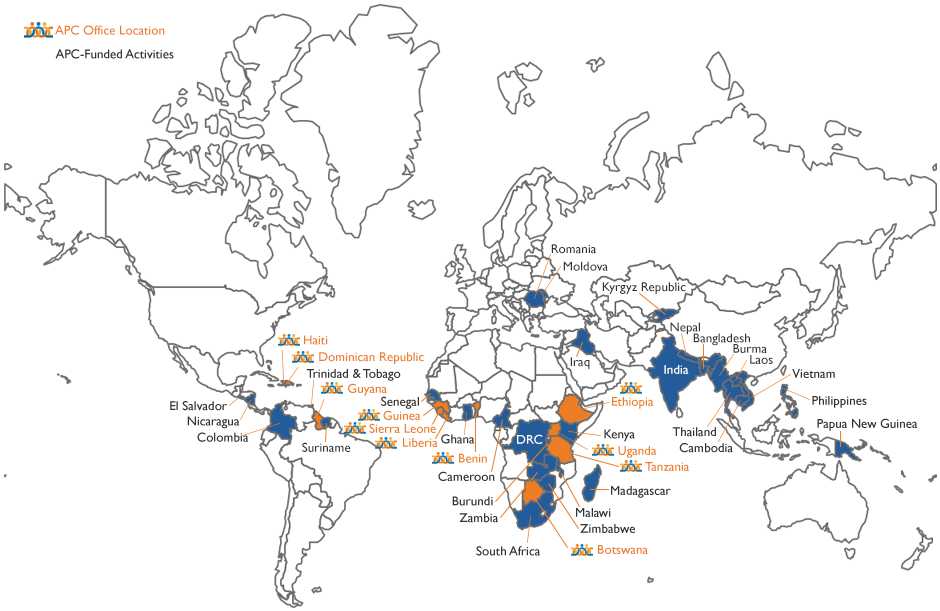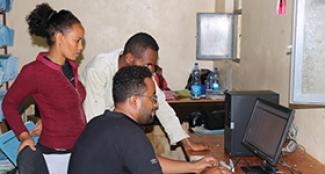Read the Advancing Partners & Communities Final Report
As APC comes to a close after seven years, we look back on how the project has improved the health and lives of countless people in thousands of communities in more than 40 countries.
More women and couples, especially those living in more conservative and hard-to-reach places, can now access a wide range of voluntary family planning methods. More patients know their HIV status and are getting the treatment they need. More survivors of Ebola virus disease are leading healthier lives with less stigma. More people who are vulnerable due to disability or live in challenging places now have access to rehabilitation, counseling, and health care.
Read the report » (PDF, 47 MB)
Our Mission
Advancing Partners & Communities (APC) advances and supports community programs that seek to improve the overall health of communities and achieve other health-related impacts, especially in relationship to family planning.
Youth Dashboard
Interactive data dashboard on youth sexual and reproductive health in Asia and the Middle East.
Community Health
Systems Catalog
A snapshot of community health systems in different countries.
APC Grants & Grantees
Strengthening NGOs through APC's grant mechanism and capacity building assistance.
Jump to Country Profiles
Our Impact
APC works to advance and support community programs that seek to improve the overall health of communities, especially in relationship to family planning (FP). Through global technical leadership and collaboration, APC’s goal is to increase support for and commitment to community-based family planning in USAID priority countries. APC aims to increase access to quality FP services, expand the contraceptive method mix, and improve upon organizations’ capability to manage USAID funds and implement high quality and innovative community-based health programs.
Search APC Resources
|
Healthy Families Thrive: Why Community Health Matters in the Journey to Self-Reliance - APC Final Report, December 2019
December 2019 | Report From October 1, 2012 to September 30, 2019, the Advancing Partners & Communities (APC) project worked in more than 40 countries to improve the overall health of communities, with an emphasis on voluntary family planning. The project was implemented by JSI Research & Training Institute, Inc. (JSI) in collaboration with FHI 360. Over the past seven years, APC expanded from its initial focus on voluntary family planning to a broad array of community-based programs in four main health areas: CBFP, HIV and AIDS, post-Ebola recovery, and vulnerable populations, which include children in adversity, people with disabilities, and victims of war.
|
Advancing Family Planning in Last-Mile Communities: Voices of Experience
December 2019 | Report Between 2012 and 2019, APC worked closely with a number of East African FBOs and CBOs to advance family planning in last-mile communities. Along with colleagues from these organizations and USAID, in September 2019 the project held a consultative workshop, “Voices of Experience,” to harvest the wisdom of individuals and groups working in this area and to inform new activities and possible funding going forward.
|
|
Developing and Strengthening the Disability and Rehabilitation Sector in Laos: Training Handbooks
December 2019 | Training Curriculum The APC Laos TEAM offered trainings on Curriculum Development, Psychosocial Support, Training of Trainers (ToT), Project Cycle Management (PCM), and Gender Inclusion to all sub-recipients. These trainings are participatory, reflective and allow as much time as possible for ‘learning by doing’ and practical application of skills and knowledge. The participant handbooks below were used in eight trainings for TEAM sub-recipients.
|
Developing and Strengthening the Disability and Rehabilitation Sector in Laos
December 2019 | Assessment Tool This Organizational Assessment template was used by the APC Laos TEAM for all applicants for TEAM funding to look at capacity in grants management, financial management, human resources, activity implementation, and monitoring and evaluation.
|






This report published by WHO is part of the process for improving the quality of care in family planning. It presents current WHO guidance on the safety of various contraceptive methods for use in the context of specific health conditions and characteristics.